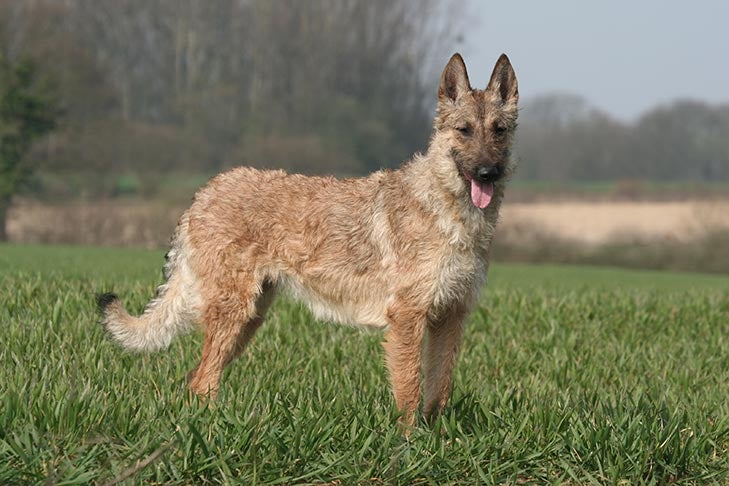
Since December 2019, the countdown clock has been ticking on the American Belgian Laekenois Association website for the coming-out party of what its members believe to be America’s best-kept purebred dog secret.
Well, the secret’s out of the bag as of July 1, 2020 when the tousled wire-coated newcomer with shade variations from fawn to mahogany will be fully recognized by the American Kennel Club and segue into its Herding Group in all-breed conformation competition.
Not only is the Belgian Laekenois (Laeken) a virtual unknown – although it has been in the AKC’s Miscellaneous Class since 2011 – it’s rare, too, with only about 200 nationwide and less than 400 in the United States since 1995. But let it be noted, this is not one of those pop-star breeds, rather it’s a solid blue-collar character.
Newly Recognized, But Far From New
Pronounced lak-in-wah, it is named for the town of Laeken where it originated and is the rarest of the four Belgian herding breeds, which in their home country is considered a single breed, Belgian Shepherd. In the U.S., it takes its place alongside the Belgian Malinois, Belgian Tervuren, and the Belgian Sheepdog.
If one word is used to characterize its history since the early 20th Century, it would be survivor. The Laeken was deployed as a messenger dog in both World Wars and was the target of a bounty by Hitler in the latter, resulting in a sizable drop in its numbers.
And if you want a bizarre definition of rare, get this: The World Wildlife Fund lists 1,846 pandas in the wild worldwide; best estimates have about 1,000 Laekenois!
The breed’s original purpose was guarding and tending to flocks and guarding linen in the fields. Today, versatility best captures this dog-sports enthusiast, which is a right at home in the city as well as country, with one giant caveat – owner commitment to thought-provoking exercise.
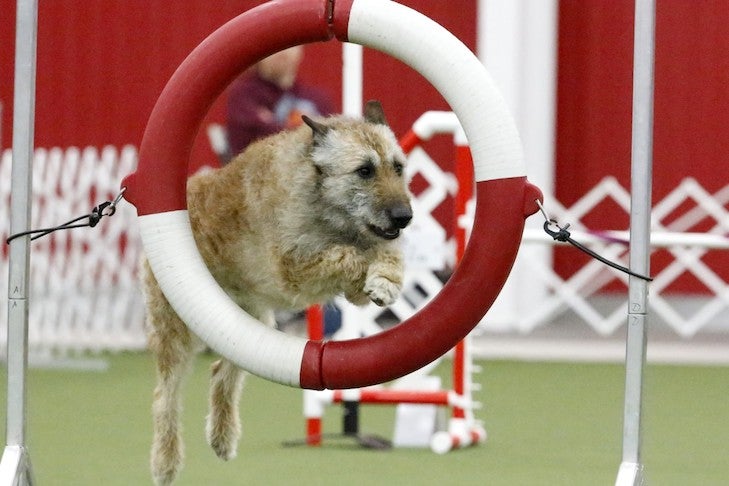
Versatile and Adaptable
The breed’s adaptability transcends the competition arena and can be seen on such far-flung fronts from therapy (occupational and physical assistance for brain and spinal-injury patients to a partner for a special-needs child) to movies and advertising.
“They are not for everyone, as they require an investment of time in positive interaction for a lifetime,” say R. Margaret Hyatt Currier and Donald L Hyatt II, Greater New Orleans area breeders. “They do not thrive in life as a Faberge Egg on display. Laekenois enjoy time with their people and can be very demonstrative with them. They are slow to reveal their connection with strangers, but accept a stranger without shyness or fear. Think of it as a dog who approaches life like a first date and prefers not to show all its cards upfront. Not rude, not aggressive, just calm and observing.”
Diane Koontz Bresee, a Knoxville, Tennessee, breeder, seconds Hyatt Currier’s early warning system assessment, “If a family is aware of the breed’s requirements and willing to responsibly maintain the dog’s safety, provide adequate exercise and play and become involved in basic obedience training, Laekenois would be ideal. If it is not engaged in a puppy’s life and training and consider the dog a casual accoutrement in the yard, it would be a disaster waiting to happen.”
Koontz Bresee points out that newcomers to Laekenois need the guidance of an experienced trainer familiar with Belgians, plus input from the dog’s breeder relative to how much exercise is required of their puppy.
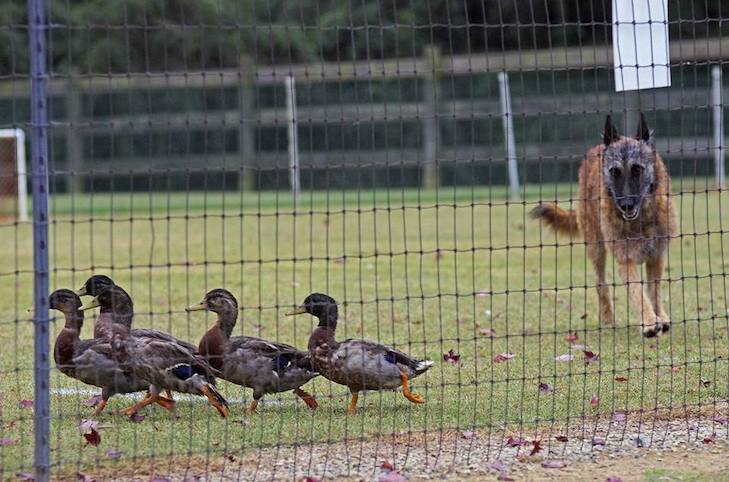
Do Your Homework
Most of the 163 parent-club members, like president Sharrii Hunt, of Newton, North Carolina, owned a variety of breeds before acquiring a Laeken. “I learned quickly the importance of early socialization – in different environments and with different ages of people — for the Laekenois,” she emphasizes. “They are what is called a ‘primitive breed, a heritage breed.’ They had to be intuitive thinkers and willing to protect owner, property and flocks. A Laeken bonds with one or two people in its lifetime, and any friends or additional family are accepted.”
If you’ve done extensive homework and decided the Laeken is the breed for you, contact the national club for a list respectable breeders, advises Kelly Goodman, of Billings, Montana, a Laekenois owner since 2004. “The Laeken is not a Golden Retriever! It is a much harder breed and needs a firm hand at times. One should only consider a dog from parents that have received health checks for hips, eyes, and heart.”

All-Around Athletes
Not all Laeken enthusiasts focus solely on dog sports. Some, like Lana Teresi, of Acampo, California, utilize them on working farms, where they assist with moving sheep from one pasture to another, pushing them out of the brush, and helping load difficult animals. “And they are awesome at keeping you company when you are doing barn chores,” she smiles.
Thus, it should come as no surprise that Teresi’s favorite dog sports are obedience, herding, and scent work. “They are a natural and daily part of our lives,” she adds, “and thrive on work. My favorite example here is asking Ike, my male Laekenois, to move the turkeys and guineas out of the backyard and into the poultry pasture. He is very patient and measured with difficult birds. Above and beyond comes to mind.”
For Carol Shields, of Holmdel, New Jersey, a Belgian Malinois owner for about two decades, Nora – named after Nora Charles, the “Thin Man” movie character – represented quite a change. “There are times that I think she can read my mind. I have never had a dog that anticipates my moves. Nora also has an opinion on everything and is vocal whether asked or not.”
Conformation, herding, coursing, scent work, Rally, and obedience are all on her mosaic Laeken calendar.
When asked to toss out a few adjectives that best describe the breed, these club members cited loyal, intelligent, smart asses, protective, intuitive, versatile, humorous, active, athletic, powerful, sensitive, durable and affectionate. In other words, the complete package.
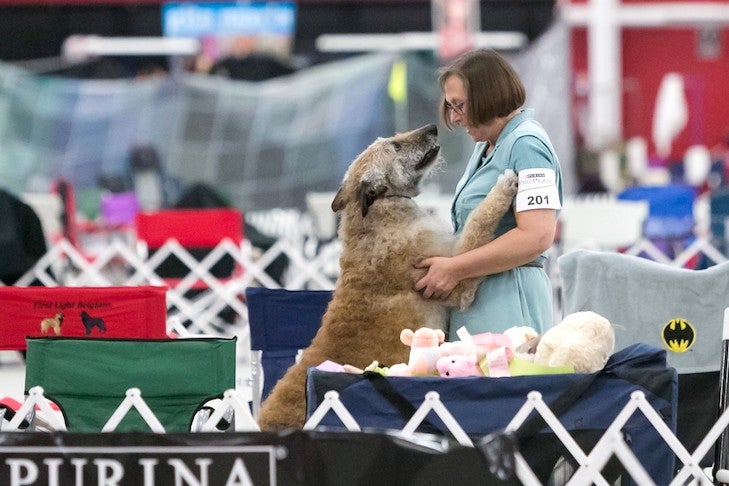
Balancing Popularity With Preservation
Whether in a competition environment or a street setting, the Laeken draws puzzled looks and plenty of questions from onlookers. Even when told the breed name, the common response is “what?”
Quality control has been the mantra of club members for years as they have carefully guided the unique-looking breed through the AKC corridor of performance events and the mixed-bag Miscellaneous Class in show circles for almost a decade.
Although giddy with anticipation surrounding its July 1 introduction into the AKC conformation world, there is a sense of anxiety, too, among longtime club members.
“While higher litter and individual registrations, along with show entry numbers are desirable if not required to maintain a viable population of Laekenois, it is imperative to protect the quality and soundness in the breed via responsible breeders and educated judges,” emphasizes Koontz Breesee.
Goodman adds, “My concern is the popularity of the breed and being able to be held to a standard of breeding. Since the Laeken temperament can vary, making certain that only sound and healthy dogs are bred is critical. With the popularity is the risk many start breeding to just make money, which could be the downfall for the breed.”
Hunt reflects, “It is vital to the breed to become fully recognized and moved into the Herding Group. But what frightens me most is the Laeken becoming a ‘flash bang’ in the breeding world. Puppy mills, irresponsible breeders, people who think the curly, fuzzy puppies are adorable and want one because of their looks. We have worked too hard to see all of our due diligence come unraveled.”
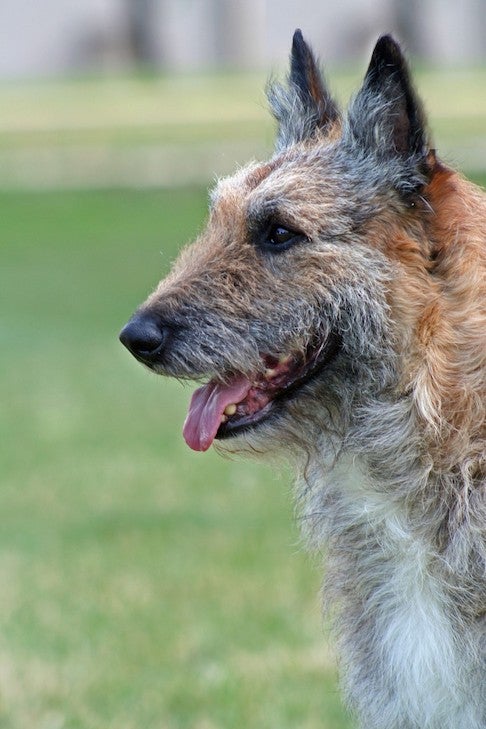
Get to Know the Laeken
In case you’re wondering what the Laeken profile includes, here’s a rundown: height, 22 to 26 inches at the shoulder; weight, 55-65 pounds; life expectancy 10-12 years; health testing, hip and elbow dysplasia and heart.
Here are several other nuggets of note: there are fewer than a dozen Laekenois breeders in the United States; there are 106 American-bred Laekenois in the country; the American Belgian Laekenois Association was founded in 1995 and lists 163 members; the highest density of Laekenois are in Louisiana, Georgia, Florida, North Carolina, and Tennessee, where nearly 25 percent of ABLA members reside.

